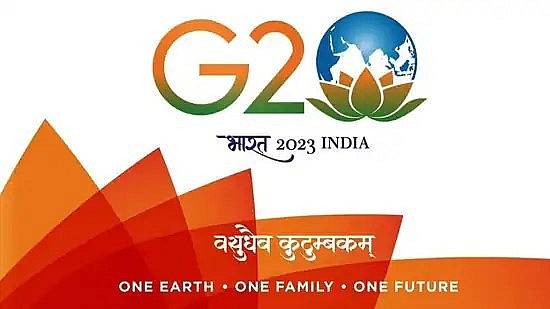 |
| India’s assumption of the G20 presidency is consonant with PM Modi’s mission of undertaking leadership roles on the international stage. (ANI) |
In a historic moment, Prime Minister (PM) Narendra Modi unveiled the logo, theme, and website of India’s Group of 20 (G20) presidency on Tuesday. The vision and objectives he outlined for India and the world have raised the already massive expectations from the presidency and further entrenched India as an architect of the global agenda. India’s assumption of the G20 presidency is consonant with the PM’s mission of undertaking leadership roles on the international stage that will allow the nation to steer change, engineer sustainability, champion the causes of emerging economies, and advance growth.
With PM Modi framing India’s imminent interventions at the G20 within the ethos of vasudhaiva kutumbakam (the world is one family), there is every indication that the qualities of inclusiveness and cooperation for the common good will prevail. Major Indian climate initiatives have recently been set into motion with the invocation of Mata bhumiah putroham prithiviyah, signifying that the earth is our mother, and we are her children. Similarly, the names of initiatives, such as the One Sun, One World, One Grid programme that India will build upon with partners at G20, reflect a spirit of unity and a shared future. As the PM observed while unveiling the G20 logo, the lotus represents shared knowledge, prosperity, and hope. These ideas stem from India’s tradition of building consensus through dialogue.
The names of initiatives, such as the One Sun, One World, One Grid programme that India will build upon with partners at G20, reflect a spirit of unity and a shared future.
The very colours of the Indian flag on the logo assume a certain symbolic significance. Saffron has traditionally been associated with strength and courage, and these qualities are amply borne out by India’s pragmatic, bold stand on climate action. The PM has set about dismantling the West’s hollow and fitful climate commitments. His newly launched mission, LiFE (Lifestyle for Environment), aims to promote sustainable and healthy lifestyles. It will democratise efforts to tackle the climate crisis, going beyond policymaking and encouraging every individual to contribute to the climate response. PM Modi has become perhaps the first political leader to state upfront and honestly that climate action will require lifestyle changes and sacrifices. Hitherto, heads of government across the world, particularly in the West, have provided glib assurances of zero lifestyle and consumption compromises while still promising to fight the climate crisis. For that courageous mindset change alone, India’s G20 leadership provides hope.
The green of the Indian Tricolour symbolises the fertility of the land and the richness of its biodiversity. Equally, it appears to reflect the seriousness with which India has approached its green commitments. India’s annual per capita carbon footprint is well under 2 tonnes, about a fourth of China’s and one-eighth of that of the United States. Nonetheless, the country pledged ambitious Nationally Determined Contributions, committing to reduce the emissions intensity of its Gross Domestic Product (GDP) by 45% from 2005 levels by 2030, and, by the same year, install around 50% of electric power from energy resources that are not fossil-fuel- based.
Even as much of the global discourse around climate response continues to focus on mitigation, India’s G20 presidency will allow it to push the adaptation agenda. This will be especially important for developing nations as they struggle to adapt to emissions already released by industrially advanced countries. India must continue to counter the tendency of developed nations to hold their lessadvanced counterparts captive to their caprices. Climate justice and equity must become the norm
India must continue to counter the tendency of developed nations to hold their lessadvanced counterparts captive to their caprices.
Reimagine the blue chakra (wheel) at the heart of the Tricolour as a blue earth in silhouette. The World Economic Forum has argued that G20 must promote a sustainable blue economy. Oceans, coasts, and the resources they harbour could act as engines of economic growth. G20 nations — which make up 45% of the world’s coastline and 21% of its exclusive economic zones – are extraordinarily well placed to foster blue development. As India leads the G20, its farsightedness about the blue economy could prove exemplary. India is finalising its national policy on the blue economy, a holistic plan to optimise all maritime sectors and develop coastal areas sustainably. Once ready, the policy could well serve as a model for other G20 nations.
Finally, India’s G20 presidency comes at a moment when the country is well on track to become a $5-trillion economy, despite the multiple challenges to growth caused by the pandemic. Technology is working for and with citizens to unleash unprecedented value and entrepreneurial potential. The resulting model is uniquely Indian. Not only has the nation emerged as the world’s first and largest truly digital democracy, but it is also catalysing the evolution of digital public goods, and citizens are producing value using them.
Digital payments in India could reach $10 trillion by 2026, and the country’s digital economy alone is expected to cross $800 billion by 2030. Boosting the global digital economy has been a core G20 objective. Helmed by India, the group will be able to draw on a wealth of cross- sectoral experience, technical expertise, and innovations that can be applied at scale.
Driven by political will, spurred by technological breakthroughs, and fuelled by an unusual optimism, 2023 will be a watershed year for India. There could not be a more consequential time to lead the comity of influential nations.
Launch of national book festival sees event move online for 2020
The Ministry of Information and Communications launched the nation’s debut online book festival on April 19 as a way of celebrating the seventh version of Vietnam Book Day, which falls on April 21 annually.








